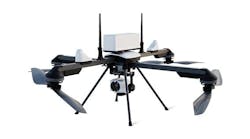Automated Aircraft Accelerates Farm to Store Supply Chain; Delivering Produce in Record Time
The Giumarra Companies and Reliable Robotics announced the joint launch of an automated flight test program to help solve supply chain and delivery challenges within the fresh produce industry. The test program, which had its successful inaugural flight on Aug. 7, saw the delivery of tree-ripened peaches from farm to grocery stores within 24 hours of harvest -- a feat yet to be available at scale for U.S. growers. The flight test served as a crucial step in reducing time and touch points between farms and consumers.
“To call this program groundbreaking is an understatement. We believe autonomous aircraft will transform the future of the fresh produce industry,” said Tim Riley, President of the Giumarra Companies. “This test proved the technology is viable and will evolve how we bring products to market by enabling us to deliver fresher, riper fruit anywhere in the country, including remote food deserts, at speeds never before seen.”
Autonomous cargo flight is on the horizon
Automated air transport redefines the term “speed to market” and will enable new product offerings not otherwise possible. Historically, domestic air transport for produce has not been an economically viable transportation option, until now. Autonomous aircraft makes this mission feasible, and also provides greater access to delivery sites, including small municipal airports in underserved areas.
Reliable Robotics achieved fully autonomous flight on the Cessna 172 Skyhawk without an onboard pilot in 2019. With this most recent milestone, the company completed an automated flight between two airports, 200 miles apart, this time with an engineer and pilot on board for safety assurance. The company has also demonstrated automated landing of the larger Cessna 208 Caravan and is in the process of certifying its automation platform for use on the Caravan, a popular cargo plane ideal for air shipments of produce.
During the flight test, a piloted Cessna Caravan transported three pallets of tree-ripened peach cargo. Upon arrival, the peaches were delivered directly to local stores, bypassing the distribution center completely. A Cessna Skyhawk followed to demonstrate that the automated aircraft could complete the same route. The pilot’s role for this flight was to push a button to initiate taxi, takeoff, approach, and landing.
“Giumarra is a forward-thinking company and we’re proud to partner with them to show how automated cargo flights can greatly improve fresh food distribution,” said Robert Rose, Co-founder and CEO of Reliable Robotics. “We believe autonomous aviation is going to change the way we experience food, for the better.”
An industry ripe for change
The automated flight test program served as compelling proof that automation can improve speed and quality for the entire fresh produce supply chain:
- Growers and suppliers can quickly and more efficiently deliver farm fresh produce to stores in less time, resulting in less spoilage.
- Retailers can offer consumers a premium experience and access to farm stand quality produce at their local grocery store.
- Consumers can more conveniently shop for sweeter tree-ripened fruit and fresh produce available at stores within 24-48 hours of being picked.
- In turn, growers can produce varieties optimized for flavor and texture versus transportation method.
These advantages will be amplified for consumers and retailers in the Midwest and East Coast as well as smaller or hard to reach markets where certain produce largely comes from California growers and distributors.
Currently, travel time for popular stone fruits like peaches, nectarines and plums can take up to seven days from farm to consumers in the lower 48 states. Fruit must typically be picked earlier, while still firm, to endure the long journey. The supply chain includes multiple links before product arrives at its destination: picking, packhouse, cooling, and transportation via truck to a distribution center. There, product is inspected and slotted until delivery to grocery stores. Automated aircraft delivery can significantly streamline these processes.
“The potential for autonomous aircraft to deliver farm fresh food is incredible. Many other types of perishable goods and high-value, time-sensitive products would benefit from this new kind of service. I expect compelling use cases will emerge that we can’t even imagine today,” said Raviraj Jain, an investor at Lightspeed Venture Partners.

